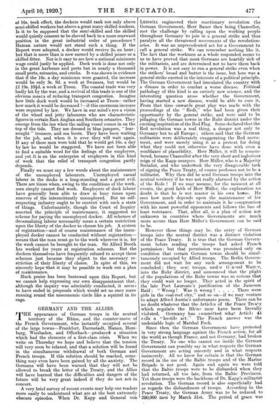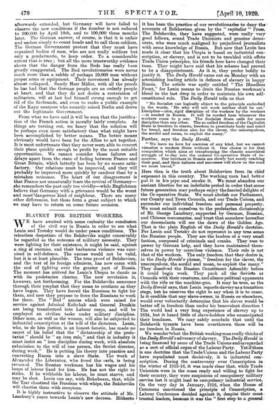GERMANY AND THE ALLIES.
A very brief survey of recent events may help our readers more easily to understand what are at the best extremely obscure episodes. When Dr. Kapp and General von Liittwitz engineered their reactionary revolution the German Government, Herr Bauer then being Chancellor, met the challenge by calling upon the working people throughout Germany to join in a general strike and thus paralyse all the threatened movements of the revolution- aries. It was an unprecedented act for a Government to call a general strike. We can remember nothing like it. The fact that the workmen as a whole responded seems to us to have proved that most Germans are heartily sick of the militarists, and are determined not to have them back in power. It is not easy to run a general strike even when the strikers' bread dad butter is the issue, but here was a general strike exerted in the interests of a political principle. The German Government had inoculated the country with a disease in order to combat a worse disease. Political pathology of this kind is an entirely new science, and the interesting question arose whether the Government, having started a new disease, would be able to cure it. From that time onwards great play was made with the proceedings of the " Reds," who had been given their opportunity by the general strike, and were said to be pillaging the German towns in the Ruhr district under the exciting inspiration of the Red Flag. Some declared that the Red revolution was a real thing, a danger not only to Germany but to all Europe ; others said that the German militarists were deliberately exaggerating the Red move- ment, and were merely using it as a pretext for doing what they could not otherwise have done with even a semblance of plausibility. Herr Muller, it will be remem- bered, became Chancellor after the very short and inglorious reign of the Kapp usurpers. Herr Muller, who is a Majority Socialist, and who undertook the very disagreeable task of signing the Peace Treaty, of course professes not to be a militarist. Why then did he send German troops into the neutral territory if he was not really alarmed by the action of the Reds ? If we may assume, for the moment at all events, the good faith of Herr Muller, the explanation no doubt is that he is not master in his own horse. He sees how much depends upon the maintenance of his Government, and in order to maintain it he compromises with his most powerful opponents and follows the line of least resistance. That, after all, is a plan of action not unknown in countries where Governments are much more secure than Herr Muller's Government can be said to be.
However these things may be, the entry of German troops into the neutral district was a distinct violation of the Peace Treaty. It is true that the German Govern- ment before sending the troops had asked French permission ; but that permission was promised only on condition that certain German towns should be simul- taneously occupied by Allied troops. The Berlin Govern- ment did not wait for any such arrangement to be concluded ; they sent troops, under Gan-ral Watt'r, into the Ruhr district, and announced that the plight of the populations of the Ruhr towns was so serious that they could wait no longer. They acted in the spirit of the late Poet Laureate's justification of the Jameson Raid : " Wrong ! Was it wrong 2 There were girls in the coal-reef city," and so on—if we may venture to adapt Alfred Austin's unfortunate poem. There can be no doubt whatever that the Articles of the Peace Treaty which regulate the Rhine zone have been literally violated. Germany has committed what Artic13 4t calls a "hostile act." The French answer was the undeniable logic of Marshal Foch. Since then the German Government have protested in very strong language against the French action, for all the world as though France, and not Germany, had broken the Treaty. No one who cannot see inside the German Government can possibly say in what respects the German Government are acting sincerely and an what respects insincerely. All we know for certain is that the German record in the use of the Baltic troops and of the Marine Brigade is not good. Again and again we were told that the Baltic troops were to be disbanded when they had returned, all too late, from the Baltic Provinces.
Yet those troops were the backbone of Dr. Kapp's militarist revolution. The German record is also superficially bad as regards the disbandment of troops. According to the Peace Treaty, the German Army, was to be reduced to 200,000 men by March 31st. The period of grace was afterwards extended, but Germany will have failed to observe the new conditions if the number is not reduced to 200,000 by April 10th, and to 100,000 three months later. The German answer, of course, is that it is unfair and useless simply to count heads and to call them soldiers. The German Government protest that they must have organized bodies of men, who are not really soldiers but only a gendarmerie, to keep order. To a considerable extent that is true ; but all the more trustworthy evidence shows that the danger from the Reds has really been greatly exaggerated. The Red revolutionaries were never much more than a rabble of perhaps 10,000 men without proper arms or equipment. Their movement has already almost collapsed. Surely Herr Muller, with all the proofs he has had that the German people are an orderly people at heart, and that they do not desire a restoration of militarism, will at last feel himself strong enough to get rid of the firebrands, and even to make a public example of the Kapp usurpers who recently seized Berlin and drove out the legitimate Government.
From what we have said it will be seen that the justifica- tion of the French action is morally fairly' complete. As things are turning out, we fancy that the solution will be perhaps even more satisfactory than what might have been accomplished by better means. The better means obviously would have been for the. Allies to act together. It is most unfortunate that they never seem able to concert their plans quickly enough to profit by the most suitable opportunities. We cannot consider these failures and delays apart from the state of feeling between France and Great Britain, which latterly has been by -no means satis- faccttoorryy. Our relations must be improved, and they will probably be improved more quickly by candour than by a mistaken reticence. The heart of our disagreement is that France not unnaturally fears the revival of Germany— she remembers the past only too vividly—while• Englishmen believe that Germany with a grievance would be the worst and mostedangerous kind of neighbour. There are many other differences, but these form a great subject to which we may have to return on some future occasion.



































 Previous page
Previous page